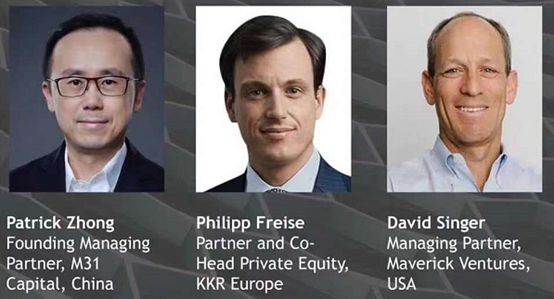Global Counsel held a one-hour panel on May 6th to discuss investing trends in a post-covid era. This session brought together senior investment professionals across three continents to reflect on the critical issues shaping investment post-covid. Under the moderation of Global Counsel Adviser Ying Staton, Patrick Zhong (Founding Managing Partner, M31 Capital), Philipp Freise (Partner and Co-Head Private Equity, KKR Europe) and David Singer (Managing Partner, Maverick Ventures) exchanged insights on the impact of Covid, markets, ESG and politics, respectively from the perspective of Asia, Europe and the US. More than 100 influential policymakers, corporates, institutional investors, family offices and journalists have joined this panel.
Here are some of the best extracts of the discussion, please enjoy:
Moderator: How have the pandemic and the associated events of the past 15 months changed the nature of your work and the way you approach investments?
Patrick: Covid reminds us that we are dealing with a very complex system, and there are a lot of factors contributing to the result and the return. To be a well-informed investor, you must have broad knowledge. The entire system must be reshaped because we are dealing with fast-changing complexities and the convergence of a lot of transcendent technologies. I think this is the foremost of what we learned from Covid.
Moderator: What is the scenario and the medium-term outlook for the global economy, the market and the implications for the companies that you and your funds are investing in?
Patrick: People are so focused on Covid that they become a little bit shortsighted to understand what is looming large on the horizon, what are the more important trends that is going to shape up our future for the next 10 years, rather just the next 3 years. It is getting exciting now to invest in China. I feel that investing in Chinese companies nowadays is similar to investing in American companies 20 years ago, in the way that there are a lot of innovative tech companies which will lead not only in China, but also the world. They are the true leaders. There are no longer copycats of anything. A lot of entrepreneurs (in China) are building state-of-the-art technologies.
By the way, for quite a long time, investors of my generation got used to linear growth. People are good at understanding 20 % growth for the next 5 years. The result would be close to somewhere like 2.5 times. But there are technologies now qualified for something called exponential growth. It is not just one company. There are a multitude of them. These companies are accelerating the rules in the virtual world. They’re really good at using data as input. Therefore, for the next 3 to 5 years, their annual growth rate is almost double (compared to the other companies). Most people do not understand the extent of having a growth rate of 90% for the next 5 years. What would be the number? That is almost 25 times. That is a much bigger number, but I think our brain is not built to understand such exponential growth.
Amazingly, the good entrepreneurs are not just leveraging one technology to disrupt the traditional industries, they are using the field. We had the experience of working with Bytedance. They have an amazing app called Tik Tok, which is extremely popular worldwide and has grabbed headline news in American politics last year. Bytedance is already large but continues to beat our expectation for topline growth. It is still growing above 100% a year. How can a company of that size achieve that kind of growth? What is going on? I think we are seeing some true innovations and acceleration of growth in the virtual world. Even the most sensitive and alert consumer would not have a good comprehension of this phenomenon. This is exactly why we need to have a group of experts who have a deep understanding of certain technologies to help us piece this puzzle together and to understand what is going on. I think this is where China is going to contribute a lot from the value creation perspective. Technologies, when used well, are going to contribute a lot of growth around the world.
Finally, for people who live outside China, China probably seems like a black box, especially with Covid. For my team, we listen to the news, follow the media, and do a lot of legwork. Our team met about 500 companies last year. As soon as the travel resumed, we went out to meet people. We covered over 90 cities in China, including a lot of lower tier cities. When the economy grows, certain people will be left behind. Considering what David was saying about wealth inequality in the US, China is not just the only place where the income gap is getting larger. Really great entrepreneurs can build a model that delivers value to the lower- and middle-income people as well. We are proud that we are investing in some of these types of companies. They are bringing value to these people and making their lives feel much better.
Moderator: How do you see this deterioration of relationship between China and other major economies? How will that have an impact on the companies that you are invested in?
Patrick: I have three rules when thinking about politics: (1) Politics is like a pendulum. It swings from the left to the right and then from right to the left. (2) In politics, fiction usually trumps truth. (3) The directions of international politics reflect the directions of domestic and local politics. I think as investors, we need to help our entrepreneurs to think and navigate through this complicated landscape out there. Hopefully when they build their strategies, we can help them understand politics can be a big factor, even international politics. I also remind them that China has become 3/4 of American’s size of economy this year. It is already sizable. With regards to the future, I never think anything is going to be inevitable. However, I always try to assign some probability to some real events. There is a real probability that China will potentially become an economy as large as America.
At that stage, if you are a leader in China, no matter what you do, you are not going to be a leader only in China and have nothing to do with the world. China is a fertile land to get everything started, so, tactically, you can build your business from within for the short term, but eventually you need to compare your products and technology with global counterparts and see if it is still going to stick in other markets.
Moderator: Do you think that we will see more international cooperation?
Philipp: There’s no way we can solve the big questions that we are facing with confrontation. We can only solve these problems with cooperation. It is clear that we had a pivotal moment as we were 100 years ago. But there are new challenges now. There is an emerging superpower. What we need is good leadership at all levels. I hope that there will be more cooperation than confrontation. If we all cannot get together around common goals like climate change, there is no other way.
David: I agree with Philipp and Patrick. I think it is going to get better. US was not a productive member of the international community by and large in the last 4 years. But that is changing, it is adopting a more appreciative approach. To get to Patrick’s point, effective solutions to wealth inequality will allow countries to be more global in their outlook. (Countries) cannot solve it without being global. I am optimistic that it is going to be a different kind of globalization, but it will continue. There is nothing holding it back, and we will all benefit from it.
For more information, please click here


